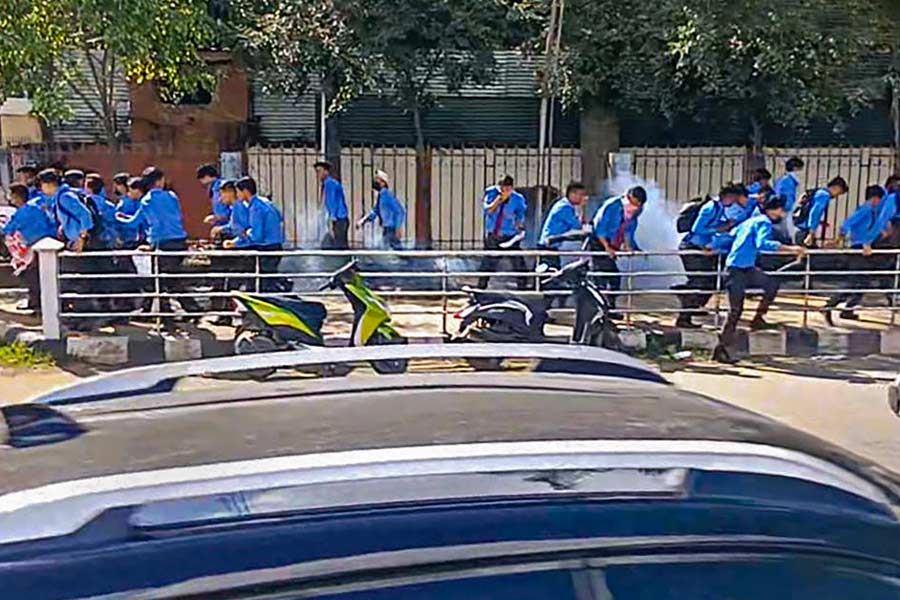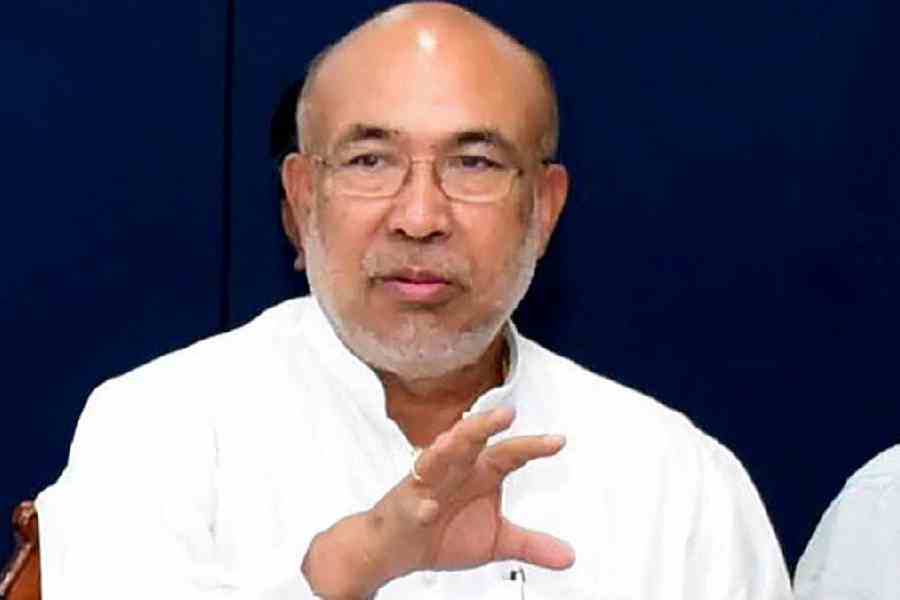Allegations that the security forces used pellet guns to quell Wednesday’s student protests in the Imphal Valley against the murder of two Meitei students have provoked wide condemnation in Manipur.
The Manipur Commission for Protection of Child Rights (MCPCR), a statutory body, demanded a “groundbreaking training manual for police and security forces", sensitising them to "juvenile justice, human rights and decent mob control standard".
The Coordinating Committee on Manipur Integrity (COCOMI), a conglomerate of Meitei civil society organisations, said that central forces flexing their muscle on students in uniform constituted “cowardice” and “a shameful act and violation of human rights”.
The student community, too, denounced the way the security forces had acted to “curb the voices of the protesters”.
A police statement on Wednesday said: “Miscreants in the crowd (of protesters) used iron pieces and stones (marbles) against security forces. In retaliation, security forces used minimum force to disperse the congregation and fired some tear gas shells in which some people got injured.”
Efforts to get a reaction from the police and other security forces on the alleged use of pellet guns were unsuccessful.
Imphal residents said over 100 protesters, mostly students, were injured on Wednesday.
A student leader said around 175 students were injured, and most of them were taken to hospitals such as Raj Medicity, RIMS, JNIMS, Advanced Hospital, Asian Hospital and Shija Hospital.
“Pellet guns, smoke bombs, tear gas shells, rubber bullets, batons were used yesterday (Wednesday) by security forces against the student protesters,” he said.
A source in the healthcare sector said some students received pellet gun splinter injuries.
A “general appeal” to “all stakeholders and authority” issued on Wednesday by MCPCR chairperson Manibabu Phurailatpam said that “lathi-charge, tear gas shells and rubber bullets should not be used arbitrarily and abruptly against children”.
It suggested that the forces adopt “less injurious means” such as “repeated convincing warning through loudspeaker, ensuring adequate barricades, water cannon may be an option as a last resort, while encountering the young children”.
It added that the “strategy and approach for controlling young student protesters must be different from (that for) adult protesters” and that “the very interpretation of ‘minimum force’ needs to be redefined and reviewed contextually”.
On Thursday, journalist Tanushree Pandey had uploaded photographs of injured students on X (formerly Twitter) with a post that said: “Are the state & central government watching? Have they given permission to security forces to subject students to this kind of treatment? PELLET GUNS & BATONS ON UNARMED STUDENTS!.…”
A pellet gun is a rifle or pistol that shoots non-spherical metallic pellets using compressed air rather than an explosion of gunpowder. The weapon was used to curb protests in Kashmir, leaving, according to Human Rights Watch, 4,592 people injured between 2016 and 2019.
The MCPCR said the “use of excessive and disproportionate” force on children and young students is “unbecoming in a democratic country” that has ratified the UN Convention on Rights of the Child and where the Juvenile (Care and Protection of Children) Act, 2005, is in force.
A copy of the MCPCR’s appeal was marked to the chief secretary, DGP, district magistrates, director of school education, and the media, among others.
The student protests began on Tuesday after photographs of the two murdered students from Imphal — Phijam Hemjit (20) and Hijam Linthoingambi (17), who had been missing since July 6 — surfaced on social media on Monday.
Students from various educational institutions staged a massive but peaceful rally in Imphal West on Thursday afternoon, seeking justice for the murdered students.
Six valley-based student organisations — the AMSU, MSF, DESAM, KSA, SUK and AIMS — have jointly urged the central and state governments to “curtail (the) excessive” militarisation in the state, arrest those behind the students’ murder, stop human rights violations while “suppressing” student agitations, and restore peace through dialogues, a student leader said.
The police said a meeting of senior central force officers at the police headquarters on Thursday decided “to use minimum force in dealing with the public, especially students”.
Protesters demanding justice for the two murdered students tried to march to chief minister N. Biren Singh’s private residence in Imphal East on Thursday night but were dispersed by security forces some 200 metres from the house.
The police said on Thursday night: “News of CM’s personal residence being mobbed is false and misleading.”












